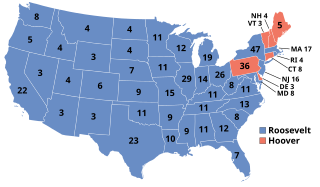
The 1932 United States presidential election was the 37th quadrennial presidential election, held on Tuesday, November 8, 1932. The election took place against the backdrop of the Great Depression. Incumbent Republican President Herbert Hoover was defeated in a landslide by Democrat Franklin D. Roosevelt, the Governor of New York and the vice presidential nominee of the 1920 presidential election. Roosevelt was the first Democrat in 80 years to win an outright majority in the popular and electoral votes, the last one being Franklin Pierce in 1852. Hoover was the last elected incumbent president to lose reelection until Jimmy Carter lost 48 years later. The election marked the effective end of the Fourth Party System, which had been dominated by Republicans.
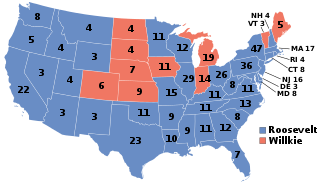
The 1940 United States presidential election was the 39th quadrennial presidential election. It was held on Tuesday, November 5, 1940. The election was contested in the shadow of World War II in Europe, as the United States was emerging from the Great Depression. Incumbent Democratic President Franklin D. Roosevelt defeated Republican businessman Wendell Willkie to be reelected for an unprecedented third term in office.

The 1952 United States presidential election was the 42nd quadrennial presidential election. It was held on Tuesday, November 4, 1952. Republican Dwight D. Eisenhower won a landslide victory over Democrat Adlai Stevenson, ending a string of Democratic Party wins that stretched back to 1932.

The 1956 United States presidential election was the 43rd quadrennial presidential election. It was held on Tuesday, November 6, 1956. President Dwight D. Eisenhower successfully ran for reelection against Adlai Stevenson, the former Illinois governor whom he had defeated four years earlier.
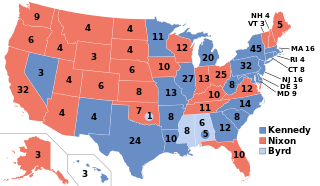
The 1960 United States presidential election was the 44th quadrennial presidential election. It was held on Tuesday, November 8, 1960. In a closely contested election, Democratic United States Senator John F. Kennedy defeated incumbent Vice President Richard Nixon, the Republican Party nominee. This was the first election in which fifty states participated and the last in which the District of Columbia did not, marking the first participation of Alaska and Hawaii. This made it the only presidential election where the threshold for victory was 269 electoral votes. It was also the first election in which an incumbent president was ineligible to run for a third term because of the term limits established by the 22nd Amendment.

Adlai Ewing Stevenson II was an American lawyer, politician, and diplomat.

During presidential election campaigns in the United States, it has become customary for the candidates to engage in a debate. The topics discussed in the debate are often the most controversial issues of the time, and arguably elections have been nearly decided by these debates. Candidate debates are not constitutionally mandated, but they are now considered an intrinsic part of the election process. The debates are targeted mainly at undecided voters; those who tend not to be partial to any political ideology or party.
A government simulation or political simulation is a game that attempts to simulate the government and politics of all or part of a nation. These games may include geopolitical situations, the creation of domestic political policies, or the simulation of political campaigns. They differ from the genre of classical wargames due to their discouragement or abstraction of military or action elements.
The 1960 Democratic National Convention was held in Los Angeles, California, on July 11–15, 1960. It nominated Senator John F. Kennedy of Massachusetts for president and Senate Majority Leader Lyndon B. Johnson of Texas for vice president.
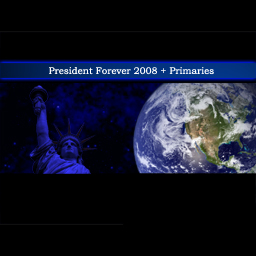
President Forever 2008 + Primaries is a political simulation game that incorporates realism mixed with fiction. It simulates United States presidential elections and primary elections in 1960, 1980, 1992, 2000, 2004, and 2008. President Forever 2008 was developed and released by TheorySpark, a developer specializing in political games, on October 12, 2006. The game is an updated version of the original President Forever.
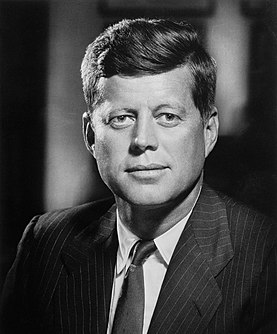
From March 8 to June 7, 1960, voters of the Democratic Party elected some of the delegates to the 1960 Democratic National Convention. The presidential primaries were inconclusive, as several of the leading contenders did not enter them, but U.S. Senator John F. Kennedy emerged as the strongest candidate and secured the nomination at the Convention, held from July 11 to 15 in Los Angeles.
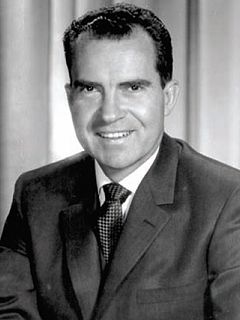
The 1960 United States presidential election in California took place on November 8, 1960 as part of the 1960 United States presidential election. State voters chose 32 representatives, or electors, to the Electoral College, who voted for president and vice president.

President Elect is a turn-based, political simulation game, first released by Strategic Simulations for the Apple II in 1981, followed by a Commodore 64 port in 1984.
Walter R. Mears is an American journalist, author, and teacher. He was one of the reporters featured in the 1973 book The Boys on the Bus, who covered the 1972 presidential election between Richard Nixon and George McGovern. He won the 1977 Pulitzer Prize for National Reporting for his coverage of the 1976 Presidential campaign and election. Mears retired from his career as a political reporter, editor, and news executive in 2001. In 2016 he joined the Osher Lifelong Learning Institute, at Duke University, as a volunteer instructor, teaching classes on election campaigns; he had previously taught undergraduate classes in journalism.

The 1960 United States presidential election in Pennsylvania took place on November 8, 1960 as part of the 1960 United States presidential election. Voters chose 32 representatives, or electors to the Electoral College, who voted for president and vice president.

The 1956 United States presidential election in New York took place on November 6, 1956. All contemporary 48 states were part of the 1956 United States presidential election. Voters chose 45 electors to the Electoral College, which selected the president and vice president.

The 1960 presidential campaign of John F. Kennedy, then junior United States senator from Massachusetts, was formally launched on January 2, 1960, as Senator Kennedy announced his intention to seek the Democratic Party nomination for the presidency of the United States in the 1960 presidential election.
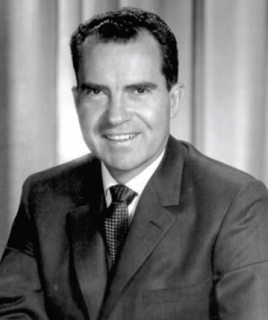
The 1960 United States presidential election in Iowa took place on November 8, 1960, as part of the 1960 United States presidential election. Voters chose ten representatives, or electors, to the Electoral College, who voted for president and vice president.

The 1960 United States presidential election in Oregon took place on November 8, 1960, as part of the 1960 United States presidential election. Voters chose six representatives, or electors, to the Electoral College, who voted for president and vice president.

President Elect: 1988 Edition is a 1987 video game published by Strategic Simulations.















